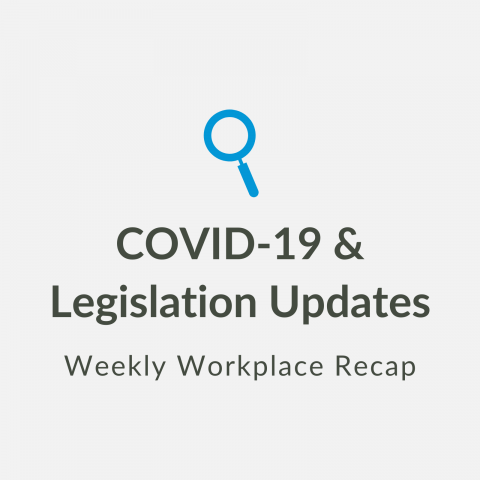COVID-19 & Legislation Updates | Weekly Workplace Recap from Feb 11 to Feb 17, 2022

Below are the key COVID-19 & legislation topics that touch on the workplace from Feb 11 to Feb 17, 2022.
Federal
Federal government invokes Emergencies Act against convoy protests
Prime Minister Justin Trudeau says he's invoking the Emergencies Act for the first time in Canada's history to give the federal government temporary powers to handle ongoing blockades and protests against pandemic restrictions.
Trudeau says the unprecedented deployment of the Emergencies Act will give police more tools to restore order in places where public assemblies constitute illegal and dangerous activities, such as blockades and occupations.
Feds lighten border measures as part of transition of the pandemic response
As of February 28, 2022:
- On-arrival testing for fully-vaccinated travellers will be eased. This means that travellers arriving to Canada from any country, who qualify as fully vaccinated, will be randomly selected for arrival testing. Travellers selected will also no longer be required to quarantine while awaiting their test result.
- Travellers will now have the option of using a COVID-19 rapid antigen test result or a molecular test result to meet pre-entry requirements.
- The government will no longer recommend that Canadians avoid travel for non-essential purposes.
Ontario
Courts rule Ontario non-competition agreements prior to Oct 25, 2021 may be enforceable
Ontario’s Bill 27, Working for Workers Act, 2021 (Act), became law on December 2, 2021. The Act amends the ESA to prohibit employers and prospective employers from entering into an employment contract or other agreement with an employee or an applicant for employment that is, or that includes, a non-compete agreement.
The Act provides that the prohibition against non-compete agreements is deemed to be in force effective October 25, 2021. The Act does not indicate whether the prohibition applies to non-compete clauses entered into prior to the prohibition’s effective date of October 25, 2021.
This question was recently answered, however, by the Ontario Superior Court of Justice in Parekh et al v. Schecter et al, 2022 ONSC 302. It'll be welcome news for many employers that the court held that the prohibition in the Act against non-compete agreements does not apply to those entered into prior to the prohibition’s effective date of October 25, 2021.
Non-competition agreements entered into prior to that date may be enforceable in accordance with the common law, but on an exceptional basis and only if the employer can establish that the non-competition restriction is reasonable in all respects.
Ontario moves to next phase of reopening on February 17
Effective February 17, 2022, Ontario will ease public health measures, including, but not limited to:
- Increasing social gathering limits to 50 people indoors and 100 people outdoors
- Increasing organized public event limits to 50 people indoors, with no limit outdoors
- Removing capacity limits in the following indoor public settings where proof of vaccination is required, including but not limited to:
- Restaurants, bars and other food or drink establishments without dance facilities
- Non-spectator areas of sports and recreational fitness facilities, including gyms
- Cinemas
- Meeting and event spaces, including conference centres or convention centres
- Casinos, bingo halls and other gaming establishments
- Indoor areas of settings that choose to opt-in to proof of vaccination requirements.
- Allowing 50% of the usual seating capacity at sports arenas
- Allowing 50% of the usual seating capacity for concert venues and theatres
- Increasing indoor capacity limits to 25% in the remaining higher-risk settings where proof of vaccination is required, including nightclubs, restaurants where there is dancing, as well as bathhouses and sex clubs
- Increasing capacity limits for indoor weddings, funerals or religious services, rites, or ceremonies to the number of people who can maintain two metres physical distance. Capacity limits are removed if the location opts-in to use proof of vaccination or if the service, rite, or ceremony is occurring outdoors.
Ontario to remove vaccine passport system on March 1, masking requirements to remain in place
Effective March 1, 2022, Ontario government will remove its proof of vaccination system. Despite removing the vaccine passport system, businesses and other settings may choose to continue to require proof of vaccination.
Masking requirements will remain in place at this time, with a specific timeline to lift this measure to be communicated at a later date.
Ontario could lift requirement for workplaces to have vaccine policies by March 1
Ontario's top doctor says immunization policies have "served their purpose" and that they could be removed as early as March 1.
Chief Medical Officer of Health, Dr. Kieran Moore says the province is reviewing directives for the need for vaccination policies across various sectors, including colleges, universities and healthcare settings, and that his goal is to lift them by the start of the next month.
Alberta
Calgary will end its masking bylaw when Alberta removes provincial mandate
Calgary councillors have voted to repeal the city's face covering bylaw, meaning it will be officially lifted when the province ends its Alberta-wide mandate.
The province lifted mask requirements for schools on Monday and the Alberta-wide mask mandate is expected to be finished as of March 1, depending on Alberta's COVID-19 hospitalization rates.
British Columbia
B.C. lifting capacity limits, reopening bars and allowing dancing, but vaccine passport to stay
Several of the province's COVID-19 restrictions were lifted at 11:59 p.m. Wed, Feb 16, allowing many activities that have been off-limits to resume.
Bars and nightclubs will reopen. Organized events such as wedding and funeral receptions will move back indoors. And all of those businesses and venues will be operating at full capacity, along with movie theatres, performance spaces and sports arenas.
Masks will remain mandatory at indoor public spaces and proof of vaccination will continue to be required for many discretionary activities.


